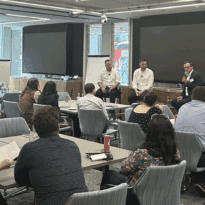Hybrid advice technology puts consumers right where the FCA wants them, at the heart of the financial advice process, says Nick Hall, business development director, Wealth Wizards.
The end customer is the most important part of the advice journey for the regulator. Hybrid advice technology, which provides consumer-led, human-assisted advice process is designed with the consumer at the heart of it. It engages with the customer, allows them to learn more and understand their current financial situation, and then gives them the ability to act on that information, to improve both their financial health and wellbeing.
Engagement is key to the UK consumer taking action to improve their financial situation. Few people wake up in the morning determined to invest into a pension or into an ISA. They want to find out more first, to be told what they don’t know. The hybrid advice model gives them the opportunity to do that via consumer-led guidance tools and then to progress to human-assisted advice when it is relevant to their needs.
By the time they come to act, whether to transact or to talk with an adviser, they should have a much firmer understanding of their financial situation and also, the reasons why the advice firm’s requests to know their attitude to risk, or their current pension details, as examples, are important to them receiving the best advice and the best outcome for their needs.
These distinct yet connected components are vitally important for consumer-led experiences, as they can also help to highlight customers who may be vulnerable or where clients give inconsistent answers, which can then be raised for a follow-up call by someone from the advice firm.
There can be a danger with a 100% digital advice process that this can be missed, which is why we believe human assistance should be accessible as part of the advice journey at some point. Hence hybrid advice not robo advice.
From the advice firm’s point of view, even when the customer is going through the digital process, the adviser is always in control. The client is unaware of the algorithm driving the digital engagement, their interaction is with the financial adviser and the advice firm.
Delivering the advice process in this way, allowing the customer to consume the information they want at their convenience, accessing further information as they need it, knowing they can talk to someone as needed, puts them very firmly at the heart of the advice process. And in doing so, it can help more people take the steps they need towards a better financial future.
Increasing the customer’s level of engagement also benefits the advice firm from a business point of view, as it helps build more loyal and longer-term relationship, so that the customer stays with the advice firm through their lifetime and their life events.
































